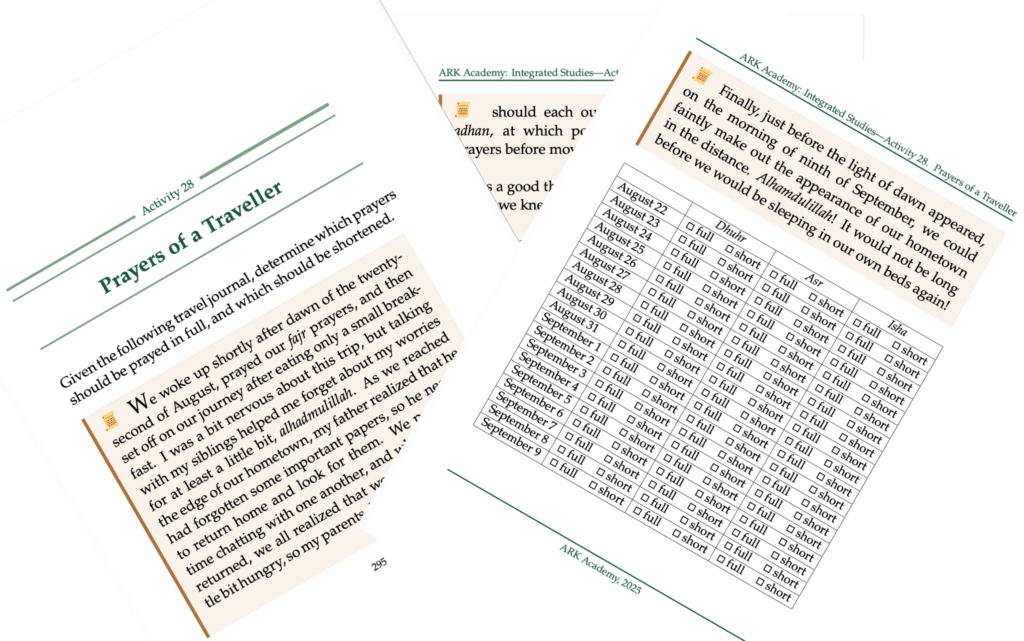In our previous blog post, we shared how ARK Academy’s Islamic studies curriculum is designed with two distinguishing features in mind: (1) the avoidance of heavy repetition (across years of study) and (2) conveying moral lessons in a way that invites reflection. In this post, we’ll take a look at a third distinguishing feature of our curriculum: (3) focus on exploration and application.
3) Focus on Exploration and Application
To date, many Islamic studies curricula have presented material and assessments with a focus on information retention and recall. Retention and recall are no doubt important: at ARK Academy we see great value in our students building a core body of knowledge in Islamic studies and other subjects, alike. That said, we also believe in going beyond retention and recall by focusing on exploration and application of the material that students have learned.
Our curriculum is being designed with in-class activities, projects, and assessments that allow students to apply what they’ve learned in new ways and/or play around with the ideas they are being exposed to in an exploratory manner. This will in turn allow our students to gain a deeper understanding of and appreciation for the material. Moreover, God willing, this approach will aid our students in making connections across traditionally separated subject domains, which is a key goal of any integrated curriculum, such as ours.
For example, consider a common existing approach to assessing knowledge of Islamic history: students are provided with the description of a particular battle fought during the life of the Prophet and are then asked to give the name of the battle, or the year in which it was fought. Now consider the following alternative assessment, which we have developed for our curriculum: students will be presented with a simple story, along the lines of “an Islamic school’s soccer coach notices that many members of the team have stopped showing up to practice after the team has begun to win many games in a row. The coach would like to say something to encourage his now overconfident team to attend practice regularly.” Students will then be asked a question like “Which famous battle that was fought during the Prophet’s life should the coach refer to in order to motivate students to attend practice?” Answering this question and presenting an adequate justification for the answer likely requires that students (i) have a working knowledge of the Prophet’s biography, (ii) understand the moral significance of various episodes in the Prophet’s life (including one or more battles), and (iii) have the skills to read this brief “story” and make connections between it and the Prophet’s life. We believe that preparing the students to answer questions such as this one will allow them to engage with the material at a more meaningful level, not only intellectually, but also emotionally, morally, and spiritually.
As another example, consider a lesson on the topic of shortening prayers when travelling. On the one hand, students could be asked to repeat or summarize the rules associated with shortening one’s prayers. On the other hand, our curriculum seeks to include potentially richer activities emphasizing application: students could be given a map and a hypothetical traveller’s travel itinerary and asked to identify on which dates (if any) the traveller’s prayers should be shortened. This allows students to put the relevant rulings into practice. Indeed, this could be extended into a larger integrated project where students develop their own travel itineraries, and then produce the following: (i) a determination of which of their prayers would be shortened (Islamic Studies), (ii) a list of real-world sites of natural or historical significance that they plan to visit during their trip (Social Studies), (iii) a breakdown of travel expenses that might be incurred during such a trip (Mathematics), and (iv) sample diary entries describing how they felt about what they saw during their hypothetical trip (English Language Arts). God-willing, what the student has learned will carry over into any future travels they embark on in reality.
What’s next
Next time, we’ll conclude this series by examining one last distinguishing feature of our curriculum. In particular, we’ll be taking a look at presenting Islamic studies at a level of depth that is comparable to that of the other “academic” subject areas (English language arts, mathematics, science, and social studies).
